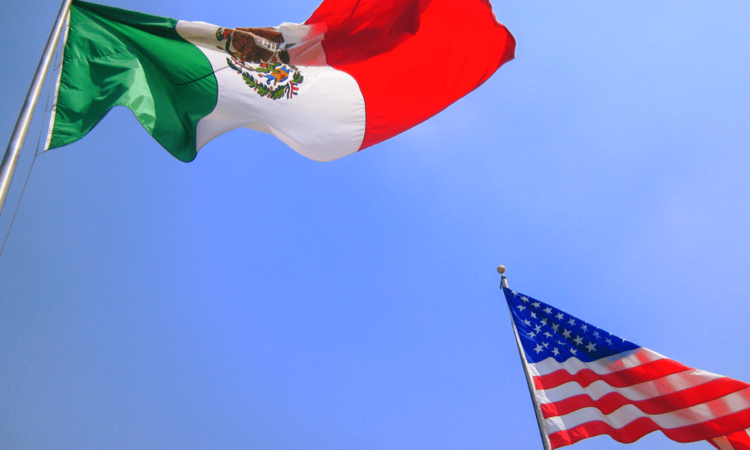
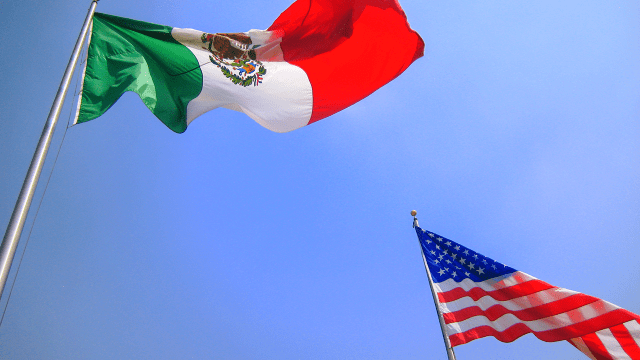
Mexicans generally have favorable views of the United States and see it as a country that provides opportunities for a good life, according to a recent Pew Research Center survey. They also have positive opinions of their own country’s economy and president.
Here are six public opinion findings from the survey of adults in Mexico, which was conducted from March 22 to April 30, 2023.
As part of a Pew Research Center survey of 24 countries conducted in spring 2023, we asked several questions in Mexico to gauge public opinion about the United States, domestic economic conditions, the state of Mexican democracy and views of Mexican President Andrés Manuel López Obrador.
Due to the coronavirus outbreak, this is the first year since 2019 that the Global Attitudes Survey has included Mexico. The survey was conducted face-to-face from March 22 to April 30, 2023, among 1,041 adults. Interviews were conducted in Spanish, and the survey is representative of the adult population ages 18 and older. The survey is weighted to be representative of the Mexican adult population by the following variables: gender, age, education, region, urbanicity and probability of selection of the respondent.
Here are the questions used for this analysis, along with responses, and the survey methodology.
A majority of Mexicans say a better life awaits people who move to the U.S. About six-in-ten Mexicans (59%) say that people who move to the U.S. have a better life there – the highest share since we began asking the question in 2007.
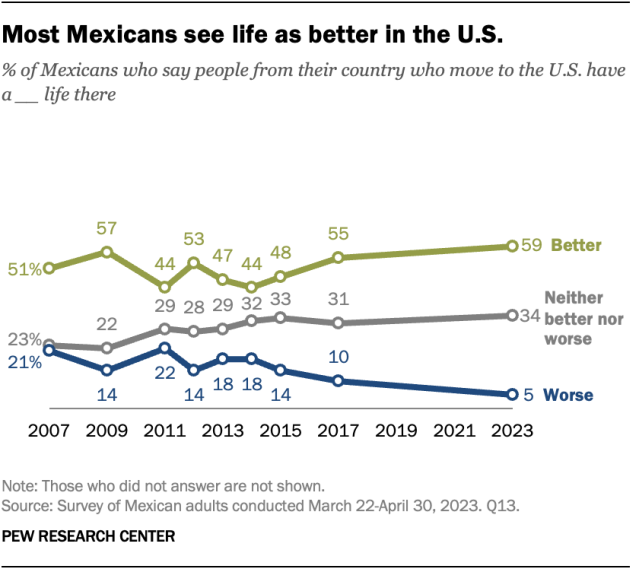
About a third of Mexicans say that life is neither better nor worse in the U.S. than it is in Mexico. Only 5% say that life in the U.S. is worse.
This data comes as growing numbers of people attempt to cross the U.S.-Mexico border, and as the U.S. public remains critical of its government’s handling of the situation at the border.
Mexicans have increasingly positive views of U.S.-Mexico relations. Overall, 63% of Mexicans have a favorable opinion of the U.S., while 30% have an unfavorable opinion.
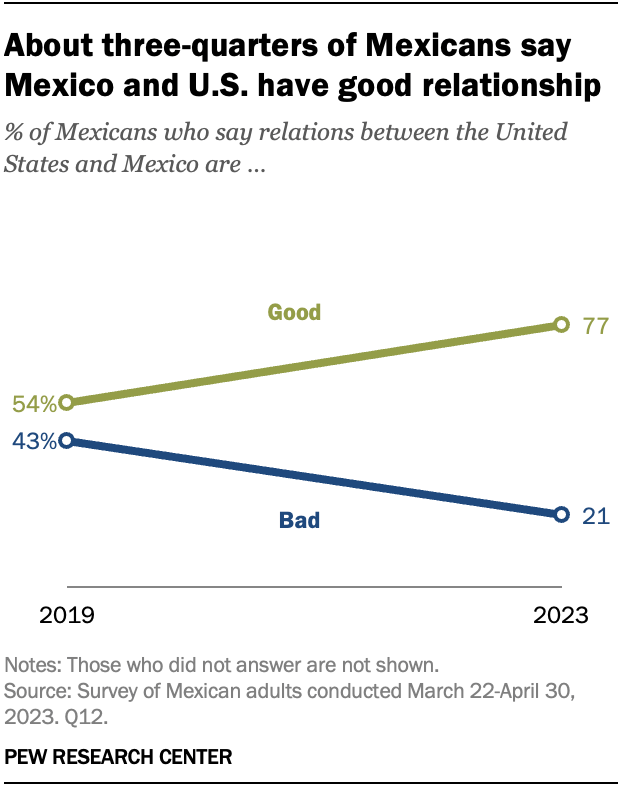
A somewhat smaller share (43%) has confidence in U.S. President Joe Biden, although this is significantly higher than the 8% who had confidence in former President Donald Trump in spring 2019.
Nearly eight-in-ten Mexicans (77%) say relations between the U.S. and Mexico are good. This share has increased more than 20 percentage points since this question was last asked in 2019, during Trump’s presidency.
However, Mexicans are split on whether the U.S. takes their country’s interests into account when making foreign policy decisions: 51% say the U.S. does, while 48% say it does not. This is a significant change from 2019, when only 32% said the U.S. considered Mexican interests.
Related: International Views of Biden and U.S. Largely Positive
Mexicans compare the U.S. with other wealthy nations both favorably and unfavorably, depending on the issue. And the Mexican public is relatively split on how the U.S. compares with other wealthy nations on several dimensions.
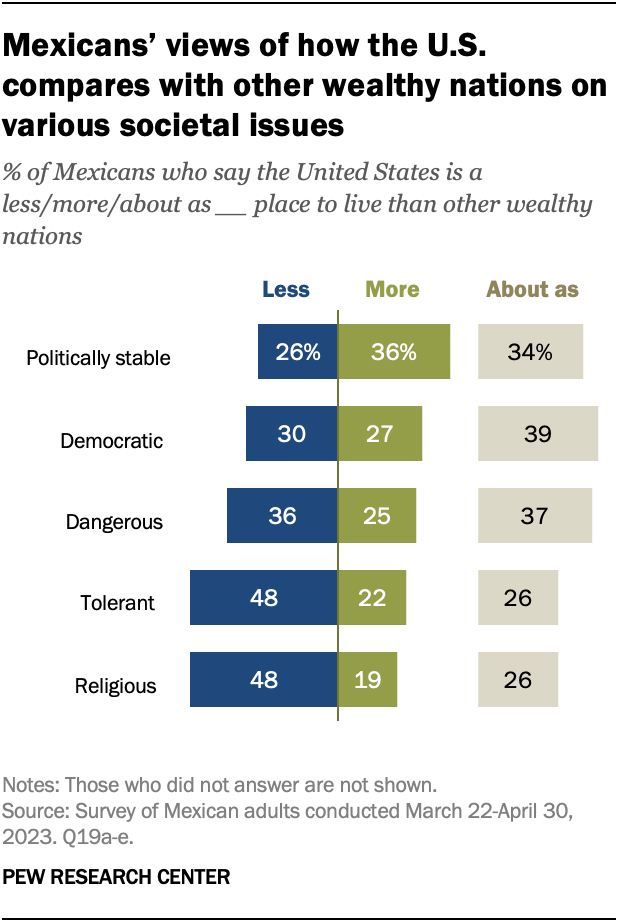
- Political stability: About a third of Mexicans say the U.S. is more politically stable than other wealthy countries. A similar share say the U.S. is about as politically stable, while roughly a quarter of Mexicans see the U.S. as less politically stable.
- Democracy: About three-in-ten say the U.S. is more democratic than similar countries. However, a plurality of 39% see the U.S. as about as democratic.
- Safety: Some 37% of Mexicans see the U.S. as comparably dangerous to its peer countries, while 36% see the U.S. as less dangerous. A quarter of Mexicans see the U.S. as more dangerous.
- Tolerance and religiosity: Almost half of Mexicans say the U.S. is less tolerant and less religious than comparable nations. In fact, among the countries surveyed in 2023, Mexico stands out as the most likely to say that the U.S. is less religious than other wealthy nations.
Mexicans generally view the U.S. and Mexican economies positively. Four-in-ten Mexicans say the U.S. is the world’s leading economic power as opposed to the other response options of China (33%), Japan (10%) or the countries in the European Union (9%).
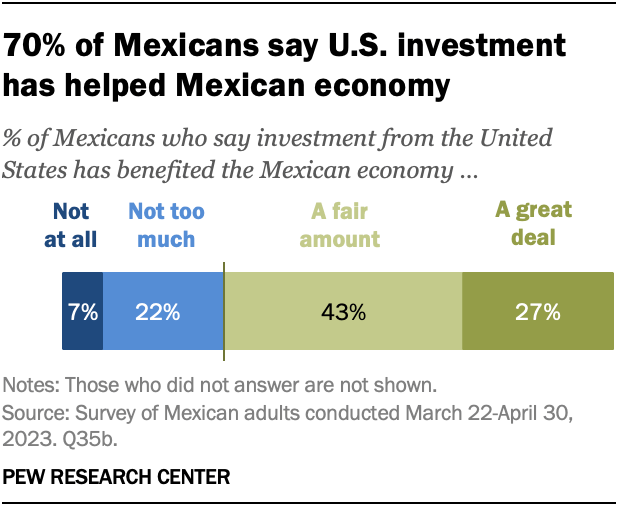
Of those who see the U.S. as the global economic leader, more than six-in-ten say it is a good thing overall for Mexico.
Along similar lines, seven-in-ten Mexicans say the Mexican economy has benefited at least a fair amount from American investment, whereas 29% say the economy has not benefited too much or at all from U.S. investment.
Although economic ratings are poor and getting worse in many countries, Mexico bucks the trend. Its gross domestic product increased by 4.5% in the first quarter of 2023, and six-in-ten Mexicans characterize their country’s economic situation as at least somewhat good. That is an increase of 11 points since 2019.
About eight-in-ten Mexicans view their president positively. Mexico’s president, Andrés Manuel López Obrador, also known as AMLO, is highly popular. Some 82% of Mexicans have a favorable view of López Obrador, including 45% who see him very favorably.
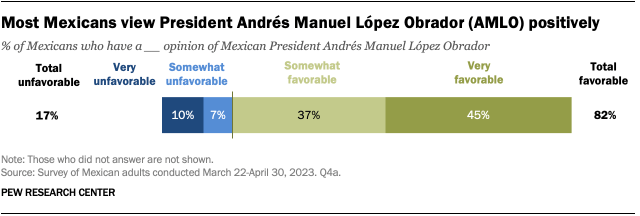
AMLO was elected in 2018 with over 53% of the vote, and his left-leaning political party MORENA and its allies took control of both houses of the Mexican Congress. AMLO is constitutionally barred from seeking reelection in 2024.
AMLO is similarly popular across demographic groups in Mexico, including across age groups, genders, education levels, incomes groups and political ideologies.
Mexicans are divided on their democracy, but sentiment has improved in recent years. This past March, Mexico’s senate approved reforms to the National Electoral Institute (INE) that international observers say threaten the agency’s independence ahead of the 2024 presidential election.
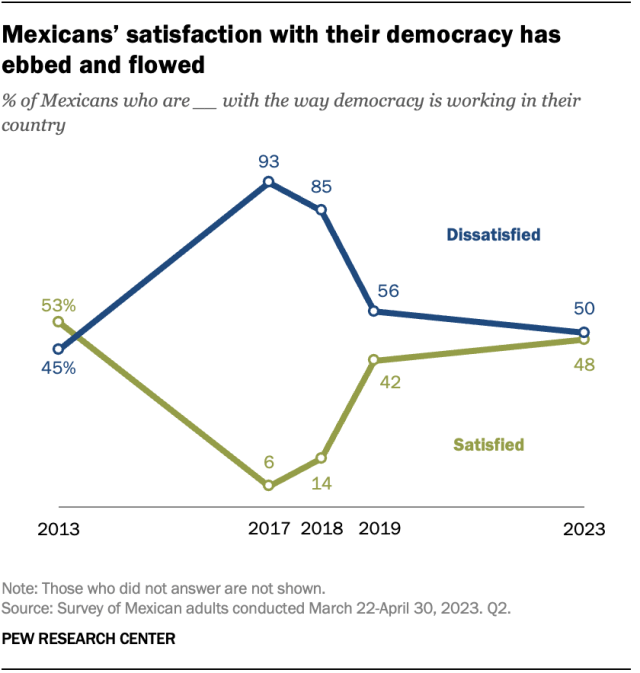
Amid these concerns, just under half (48%) of Mexicans say they are satisfied with the way democracy is working in their country and 50% are dissatisfied.
The share who is satisfied with Mexico’s democracy has increased by 6 points since the question was last asked in 2019.
However, the 42% who viewed Mexico’s democracy positively that year was a massive increase from 2017, when just 6% were satisfied with the state of Mexican democracy. Some 93% were dissatisfied, including 70% who were not at all satisfied.
Note: Here are the questions used for this analysis, along with responses, and the survey methodology.








